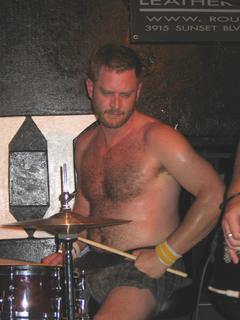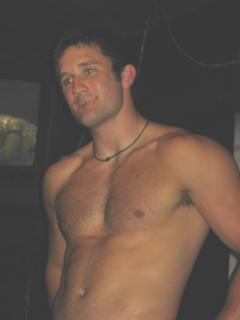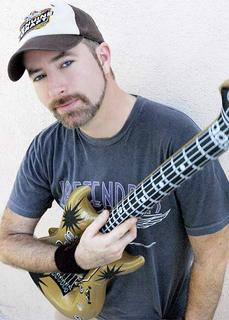Am I Turning into a Cartoon?
Am I turning into a cartoon? I'm not too sure. Sometimes I think I am just becoming this caricature of myself as I get older and older -- you know, the self-publicizing writer trying to get ahead in the world, the guy with a healthy fondness for cock and an equally healthy fondness for gay rock music. Some people seem to think they have me pretty well pegged. (I sure wish some of them would peg me, mmm-kay? But that's another (X-rated) blog entry entirely.)
 The guys over at adult Web site JapanBoyz.com certainly think I'm a cartoon. In fact, their on-site artist, Brian, was kind enough to do this animated rendering of me--for free--as I had done a story on the JapanBoyz site for AVN Online. I've always wanted to have one of these things, and it's already come in very handy. I'm going to be using for a lot of press purposes (I'm sticking a label of the pic on a bunch of portfolio folders going out to mainstream mags next week), and I'm so happy with the rendering. I have to say, I was a bit surprised how much more toned and, er, buff they made me look, but hey, it gives me something to aspire to, right? In a way, it's flattering: Maybe this is how someone else sees me. So much of my early adulthood has been bogged down with such stupid thoughts as "Am I hot or not?" that it's nice to let go of that and just be myself. Having someone else conceptualize me as being so kinda of foxy makes my day, but I'm able to walk away from it with a smile on my face but knowing that I have more important fish to fry. (Not that I eat anything fried these days! Gotta watch my boyish figure! LOL!)
The guys over at adult Web site JapanBoyz.com certainly think I'm a cartoon. In fact, their on-site artist, Brian, was kind enough to do this animated rendering of me--for free--as I had done a story on the JapanBoyz site for AVN Online. I've always wanted to have one of these things, and it's already come in very handy. I'm going to be using for a lot of press purposes (I'm sticking a label of the pic on a bunch of portfolio folders going out to mainstream mags next week), and I'm so happy with the rendering. I have to say, I was a bit surprised how much more toned and, er, buff they made me look, but hey, it gives me something to aspire to, right? In a way, it's flattering: Maybe this is how someone else sees me. So much of my early adulthood has been bogged down with such stupid thoughts as "Am I hot or not?" that it's nice to let go of that and just be myself. Having someone else conceptualize me as being so kinda of foxy makes my day, but I'm able to walk away from it with a smile on my face but knowing that I have more important fish to fry. (Not that I eat anything fried these days! Gotta watch my boyish figure! LOL!)So, anyway, in the few days since my emotional breakthrough with my mom, my life has taken a bit of an interesting turn. Suddenly, things that might have once bothered me seem so less important to me now. Like today, I got a rather disgruntled email from someone who was involved in the homocore scene who'd read the book who complained that he didn't feel that he'd been adequately given the credit he was due, and he pointed out a bunch of things that he felt were inconsistencies in the book. My response (not in these words): "Thanx for the email. I agree with you; the book just scratched the surface of the movement, but get over it, dude. You were mentioned."
 Anyways, I didn't get to update you folks on the outcome of my interview with Liz Phair. Can we just say, WOO HOOOOO??? I haven't turned the article in to my editor at Frontiers yet, but I do want to include just a smidgeon of what it was like for me to connect with her (albeit over the phone). I really feel like we connected; like you could just tell she was thinking, "This guy gets me." Here's a snippet of our dialogue:
Anyways, I didn't get to update you folks on the outcome of my interview with Liz Phair. Can we just say, WOO HOOOOO??? I haven't turned the article in to my editor at Frontiers yet, but I do want to include just a smidgeon of what it was like for me to connect with her (albeit over the phone). I really feel like we connected; like you could just tell she was thinking, "This guy gets me." Here's a snippet of our dialogue:Me: What struck me as so odd about the backlash on your last record was that I had kind of always thought of you as somewhat of a pop singer, because your songs had a very pop—albeit an indie pop—sensibility to them. I didn’t think you were selling out at all, but rather just more fully expressing that element in your music that had always been there to begin with.
Liz: I think that’s really insightful that you would say that, because for me, my music started with the Girlysound stuff, which was pre-Exile and pre-label release, and it was very poppy and playful, ditzy, all sorts of things. Guyville was really my big moment, and it defined me, but it didn’t actually define my musical style. That was what I was for that period. And I think it’s something… if you look at any of that stuff… “Never Said” was completely trying… all sorts of pop beginnings in there. But I think what happened was Guyville represented something to a group of people that went beyond what style I was, and it became very important that I sort of maintain that for them.
There were a whole lot of neat little moments where she laughed, where I laughed, where it seemed we were connecting on a really good, mutually respectful level, and it was just a great experience all around. I can't wait to write this one up. There's talk that I might even get to interview Sheryl Crow next. Fingers are so crossed for that one, of course!
In the meantime, there are some cool things happening with the Homocore book. I've been contacted by Sirius Radio and Q TV to do spots on their talk shows, which I'm really exicted about. And a little nervous as well, but hey, that just comes with the territory.
Anyway, if you folks haven't read the way-cool interview that I did with AfterElton.com about the Homocore book, you should probably check it out. It talks a lot about the experience of writing the book for me, and I think it should answer some of these looming questions about how limited the book is in its study of the queercore movement. (Hey, you can't please everyone, right? F#ck your rock star egos! I don't got time for it! I have my OWN ego to feed!)
I also just came across this review that was done in the Washington Blade, which I thought was pretty cool. Check it out here if you want. Thanx to Van Gower for such a fair review!
The following review is one of the more even-tempered reviews, and I think the author (Robert Morast) is very fair in his assessment:
Journalist Ciminelli and freelance writer Knox should be applauded for bringing the gay underground rock scene out of the closet-but not too loudly. Because while their book sheds some much-needed light on an interesting subgenre that's often ignored or distorted by the mainstream media, the authors do little to validate the musicians they cover. Chapters on influential figures like punk band Pansy Division or ex-Indigo Girl Amy Ray read like PR essays; this lack of objectivity diminishes the book's potential as a sociopolitical force. Still, Homocore proves its relevance with insights from Extra Fancy frontman Brian Grillo, who describes the discrimination he faced after his band was signed to a major label, and drummer Alicia Warrington, who talks about how early homocore artists gave her the strength to pursue her passion in a heterosexual-dominated music industry. Though far from a definitive account, this is a nice start. Recommended for extensive music libraries or any libraries that fly the Rainbow flag.-Robert Morast, Argus Leader, Sioux Falls, SD
Meanwhile, writer Jay Laird summed up his thoughts on the book in the following review found on the Provincetown-based paper EDGE.
 So far, the press has been pretty good, if a tad mixed, which is to be expected. After all, the book really just scratches the surface of the movement, and there are many very deserving folks who got left out of it (or whose stories weren't fully told). My good buddy, drummer Bilito Peligro (one of the hottest men in all of L.A., who's also a member of the Gay-Gays), for instance, should have gotten more love out of me and Cim, but well... when you're running up against deadlines and your publisher is bearing down on you asking for the book, you kinda gotta get it done quickly. (That is a picture of Bil, in fact. Isn't he quite the hot sweaty stud? It if weren't for him and his band Best Revenge, I never would have gotten so involved in the queer rock scene here in L.A. in the first place! So thanx, Bil! And if you're ever single again... PLEASE call me! LOL!)
So far, the press has been pretty good, if a tad mixed, which is to be expected. After all, the book really just scratches the surface of the movement, and there are many very deserving folks who got left out of it (or whose stories weren't fully told). My good buddy, drummer Bilito Peligro (one of the hottest men in all of L.A., who's also a member of the Gay-Gays), for instance, should have gotten more love out of me and Cim, but well... when you're running up against deadlines and your publisher is bearing down on you asking for the book, you kinda gotta get it done quickly. (That is a picture of Bil, in fact. Isn't he quite the hot sweaty stud? It if weren't for him and his band Best Revenge, I never would have gotten so involved in the queer rock scene here in L.A. in the first place! So thanx, Bil! And if you're ever single again... PLEASE call me! LOL!)At any rate, I have a few very interesting things on the horizon coming up, so look for another entry to follow in the next day or so about what's been going on in my La-La Life as of late, and be sure to keep in touch with me at LaLaLifer@aol.com, OK?
XOXO,
Hollywood Ken








